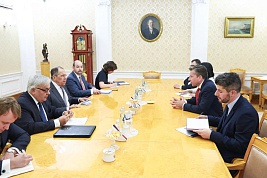Press release on Foreign Minister Sergey Lavrov’s participation in the upcoming 18th East Asia Summit
The 18th East Asia Summit (EAS) will convene in Jakarta on September 7. The EAS was established in 2005 as a forum for leaders of the Asia-Pacific region countries to engage in a broad spectrum of strategic, political, and economic issues representing common interests and to advance regional practical cooperation in alignment with the guidelines set by its leaders.
Initially, the East Asia Summit operated along six tracks: energy, finance, disaster response, healthcare, education, and regional connectivity. Today, following a revision conducted as part of the efforts to adjust the 2018-2022 Manila Plan of Action and the 2023-2028 Jakarta Plan of Action, this list has expanded to encompass additional areas, such as regional security, maritime cooperation, food security, the economy, sustainable development, poverty alleviation, environmental protection, climate, tourism, and support for women and youth.
The EAS comprises ASEAN member states, including Brunei, Vietnam, Indonesia, Cambodia, Laos, Malaysia, Myanmar, Singapore, Thailand, and the Philippines. Additionally, ASEAN dialogue partners, including Russia (since 2010), Australia, India, China, South Korea, New Zealand, the United States, and Japan are involved in EAS discussions. This year, East Timor has been invited to attend the EAS events as a candidate for ASEAN membership. The East Asia Summit is steered by the ASEAN Chair, which in 2023 is Indonesia, followed by Laos, in alphabetical order.
The annual EAS calendar includes annual meetings between the heads of state and government of the participating countries, meetings between foreign ministers and senior officials, as well as contacts via sector-specific mechanisms.
On July 12-14, in Jakarta, Foreign Minister Sergey Lavrov took part in ministerial meetings held in formats such as Russia-ASEAN, EAS, and the ASEAN Regional Forum on Security (ARF).
The current activities within the East Asia Summit mechanism are monitored through regular consultations among permanent representatives of the EAS participating countries at ASEAN in Jakarta.
The agenda for the upcoming meeting will be structured around current regional issues and the development of practical cooperation. Priority areas for sectoral cooperation include the economy, energy, environmental protection, healthcare, maritime cooperation, disaster response, food security, education, and regional connectivity.
Russia advocates using the EAS platform to expand multi-pronged practical cooperation with a focus on sector-specific projects. Our initiatives on this platform include efforts to establish regionwide collaboration in pandemic response with the launch of a collective response mechanism to epidemic threats and the development of practical cooperation in the field of tourism. Relevant Russian proposals have been part of top-level thematic documents.
Responding to the increasing regional demand for expanding volunteerism, Russia has proposed including this area of activity on the EAS agenda. This proposal found reflection in a statement by the Chairman of the 17th East Asia Summit (Phnom Penh, November 13, 2022). This dynamically evolving phenomenon of civic responsibility shows prospects for deepening social and humanitarian interconnection in the region and strengthening people-to-people contacts. Despite Russia's initiative being supported by ASEAN, the Western wing of the EAS continues to attempt to block its advancement.
Work continues within the framework of an EAS-based dialogue for improving regional security architecture, something that was spearheaded by Russia in 2013. The most recent meeting in this format at the level of permanent representative of the EAS participating countries at ASEAN, with the participation of experts from the capitals, took place in Bandung, Indonesia, on May 23.
During the East Asia Summit, Russia considers it critical to highlight the growing risks to peaceful and sustainable development in the Asia-Pacific region against the backdrop of the West’s confrontational policy aimed at militarising the regional space, with the potential involvement of NATO and the dismantling of the established ASEAN security architecture and replacing all of it with “Indo-Pacific” bloc-based constructs based on containment and counteraction principles.
Russia advocates strengthening the system of country-to-country relations in the region, including by aligning ASEAN with regional formats in the Eurasian space, primarily the SCO and the EAEU, which, like ASEAN, operate on a positive non-bloc agenda of connectivity and co-development.
Since 2017, the leadership of the executive bodies of the SCO and the EAEU has been regularly invited to attend ASEAN's top-level events. The SCO Secretary-General participated in the East Asia Summit in 2017 and 2022. This year, EAS guests will include the Indian Ocean Rim Association (IORA) and the Pacific Islands Forum.

